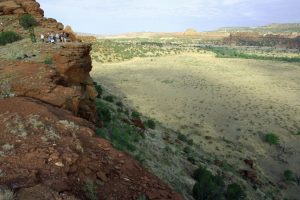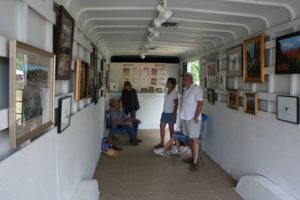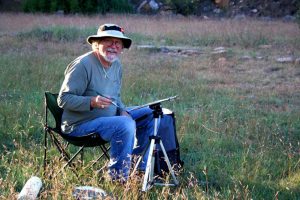‘Everybody loves a David versus Goliath story,’ says coalition member
T’Naus Nieto
The Chronicle-News
Back in the early 2000s, Doug and Lori Holdread played pivotal roles in a grassroots movement that bridged people across the political spectrum and united a coalition of ranchers, artists, archaeologists, and activists to successfully halt the expansion of the Piñon Canyon Maneuver Site.
Now, decades later, Doug is set to share their story and the strategies behind their success in a presentation, “Rooted in Trinidad: Rural Organizing in Southeast Colorado” on Jan. 11, 2025, at the Trinidad Community Center.
“We built an amazingly broad coalition, from rabid right-wing property rights advocates to peace-and-justice folks,” Doug said in an interview with The Chronicle-News. “We kept a laser beam focus on one shared issue (preserving the canyons, agricultural land, and personal property from becoming military training grounds).”
Doug described himself as a lifelong activist who opposed the Vietnam War even while serving in the military and noted that in order to keep people united, they didn’t mention or campaign for any issue that was directly related to the campaign.
According to the couple, the Piñon Canyon Maneuver Site expansion would have turned historic ranchland and beautiful canyons into military training grounds, displacing families and erasing cultural and historical landmarks.
For ranchers in the region, many of whom had fought alone against the site’s establishment in the 1980s and lost, had to adjust their mentality and welcomed support from any one who was willing.
“Doug’s technical skills were cutting-edge for the time,” Lori said. “None of the ranchers could use computers, and Doug handled that for them. He also organized statewide artist events, turning ranchers’ lands into art studios.”

The couple spearheaded creative initiatives that turned the fight into a cultural movement. Artists painted the canyons, their works exhibited in a traveling mobile gallery that they tranformed from a furniture trailer, which the coalition used, along with pamphlets, to travel around the state and educate people on the fight against the expansion. Journalists documented the lives of affected families, sharing personal stories that highlighted the human cost of expansion.

“Everybody loves a David versus Goliath story,” Doug said. “We had really good objective journalist that shared that story.”
Doug emphasized the importance of thinking outside the box. He said, “We sold square inches of Piñon Canyon land for $10 each,” he said. “People wanted to feel personally connected to the fight.”
For Doug, the fight was deeply personal. During a transitional period in his life, after going through a divorce, he walked the entire length of the Purgatory River, which flows along the southern edge of the maneuver site. The pilgrimage, which he completed in segments over two years, created a profound connection to the land.
“That journey was a defining moment for my life, even to this day,” Doug said. “I felt spiritually connected to the land and felt a responsibility to protect that river and the basin. Even though I didn’t own property, I loved the land in a very deep and personal way.”

The couple also discovered ancient pictographs and archaeological sites on private lands during the campaign. “There are over 700 sites at Piñon Canyon eligible for the National Register of Historic Places,” Doug said. “The history here is incredible, prehistoric sites and landmarks like the Santa Fe Trail.”
Doug said, reflecting on some surprising support, “Somebody in the Army was leaking documents to us. We never figured out who it was. But one of the documents we got was redacted, some of the information was blacked out. But it was the old-fashioned way, with a black marker. You could still see bits and pieces of the letters and the numbers. So I spent a lot of time deciphering the words underneath the black out, and it was right. For example, one of the things that was blacked out, was how many refuges would be created by the expansion, basically taking over these communities.”
According to the couple, the coalition was eventually able to score major victories, winning votes in the state legislature by landslides, and the Army was eventually forced to discontinued its plans for expansion.
The couple credited much of their success to the coalition’s ability to sidestep divisive issues and focus on shared goals. “We didn’t talk about who was running for president or gun rights,” Lori said. “Everyone just agreed to be polite and stay focused.”
Doug said. “All these dimensions came together.”




